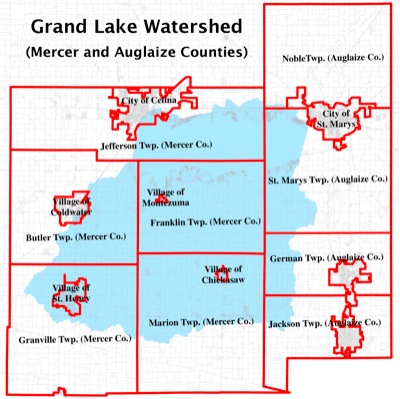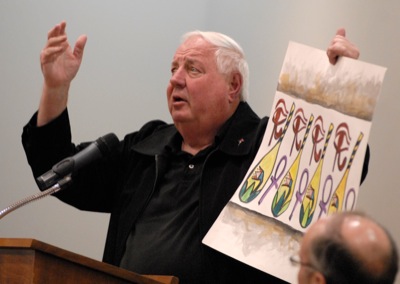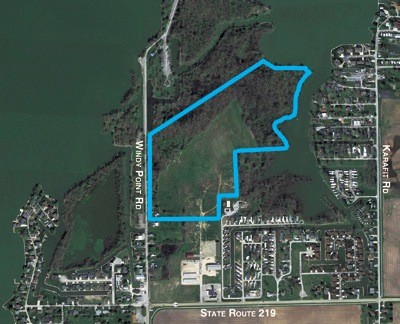Wednesday, October 23rd, 2013
LFA holds first official meeting
By Shelley Grieshop

Submitted Photo
This map shows the boundaries of the Grand Lake Watershed, villages, cities and townships. Representatives will be chosen from the 15 political subdivisions to serve on the new Lake Facilities Authority tax advisory committee.
CELINA - The Lake Facilities Authority officially met for the first time Tuesday as a state-recognized group focused on improving Grand Lake's water quality.
Its board of directors - commissioners from Mercer and Auglaize counties - discussed plans to draft and adopt formal resolutions for the establishment of the LFA and the appointment of a taxing advisory council.
The joint resolution will be written by Mercer County Assistant Prosecutor Amy Ikerd, who was present, and reviewed by the LFA board before adoption at a future meeting. A date was not set.
Mercer County Commissioner Jerry Laffin asked how the LFA is categorized.
"Once the entity is formed, it is its own separate political subdivision," Ikerd explained.
Legislators created the LFA in this year's state budget bill; it is the only LFA in Ohio. The group, which could not officially meet until after Oct. 1, can apply for and receive grants, purchase and sell land and propose a tax levy to appear on the ballot for voters in the impacted areas.
LFA members, along with Mercer County Economic Development Director Jared Ebbing and longtime lake advocate Milt Miller, confirmed the LFA meets all the criteria set by the state: a man-made lake spanning more than one-half mile squared; a designation as an impacted watershed; 24 months of EPA microcystin toxin tests showing an excess of 80 parts per billion; and a minimum average of 4,000 state park visitors per year for the last four years.
To meet another state requirement, Mercer County Engineer Jim Wiechart created a map of the impacted Grand Lake Watershed, showing all 15 affected political subdivisions. They include Celina, St. Marys, Coldwater, Montezuma, St. Henry and Chickasaw; the townships of Granville, Marion, Butler, Franklin and Jefferson in Mercer County; and Jackson, German, St. Marys and Noble in Auglaize County.
Much of Tuesday's discussion centered around the required appointment of a taxing advisory council with representatives from each of the 15 political subdivisions. Auglaize County Commissioner Doug Spencer - reading from the Ohio Revised Code - told the group a notice must be sent to each of those entities seeking council members within 60 days of the creation of the LFA board of directors.
Ebbing stressed the council didn't need to hold frequent meetings or be heavily involved with the LFA.
"They really don't have to have tax advisory (council) meetings until its needed," he said.
Auglaize County Commissioner Don Regula disagreed.
"If I'm on that advisory committee, I want to be in on the initial meetings," he said.
Spencer said the committee's duties will be spelled out by the LFA.
Ebbing said it's important the public realizes the LFA wasn't solely created to propose taxes. He suggested the group first focus on acquiring grants and other funds to purchase land near the lake to slow development and create buffers and wetlands.
Miller concurred, saying the LFA "can't lose sight of its purpose." He reminded the group the council can only recommend a tax levy; the board of directors can put it on the ballot but the public has the final say.
Before the meeting concluded, Laffin asked if the Community Improvement Corporation - also comprised of all six commissioners - would cease to exist. The CIC handled financial matters for Grand Lake clean-up efforts, similar to the role of the LFA, but its power was limited.
"I'd like to see the CIC stick around," Ebbing said, adding the nonprofit organization is "another tool in the toolbox" for officials to use.




